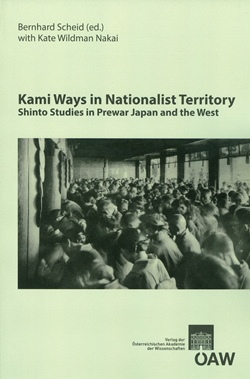
Kami Ways in Nationalist Territory. Shinto Sudies in Prewar Japan, pp. 237-264, 2013/07/24
Shinto Studies in Prewar Japan and the West
Shinto is often regarded as Japan’s indigenous religion retaining archaic elements of animism and nature worship. At the same time, Shinto is sometimes seen as nothing else than a nationalistic political ideology. After all, in 1868 Japan turned into a modern nation state and worship at Shinto shrines became a national cult. This so-called State Shinto was eventually abolished under the Allied Occupation in 1946 but the historical links between Shinto and Japanese nationalism led to an ambiguous evaluation of Shinto not only at the popular level but also at the level of scientific research.
The present volume comprises eight essays by leading experts of Japanese intellectual history from Japan, Europe, and the USA who tackle this issue from the point of view of research history: What is the impact of State Shinto on Shinto research before and after the Second World War? How did Japanese and international scholars contribute and/or react to the ideological framework of Japanese nationalism? How did nationalist discourses of other countries (in particular German National Socialism) influence the representation of Shinto? As each essay addresses these issues from a specific angle, it becomes clear that there never was just one ideology of State Shinto. Moreover, the emphasis on Shinto ritual by the political authorities weakened the significance of academic research of Shinto as a tool of propaganda. Regarding the concept of Shinto proper, the impact of modern, “westernized” religious studies seems at least as important as traditional, “nativist” approaches.
Der vorliegende Band enthält acht Beiträge führender Experten der japanischen Geistesgeschichte aus Japan, Europa und den USA, die diesen Fragen aus wissenschaftsgeschichtlicher Perspektive nachgehen: Welchen Einfluss übte der Staatsshinto auf die Shinto-Forschung vor und nach dem Zweiten Weltkrieg aus? Wie reagierten japanische und internationale Gelehrte auf die ideologischen Bedingungen des japanischen Nationalismus, inwiefern trugen sie dazu bei? Wie weit prägten nationalistische Diskurse anderer Länder (insbesondere der Nationalsozialismus) die Darstellung des Shinto? Aus den verschiedenen Blickwinkeln der einzelnen Beiträge wird deutlich, dass es keine einheitliche Ideologie des Staatsshinto gab. Die Betonung der rituellen Aspekte des Shinto durch die politischen Eliten führte vielmehr dazu, dass die akademische Shinto-Forschung als Mittel nationalistischer Propaganda von vergleichsweise geringer Bedeutung war. Für die Konzeptualisierung des Shinto selbst waren die modernen, „westlichen“ Religionswissenschaften anscheinend ebenso wichtig wie traditionelle, „nativistische“ Ansätze.